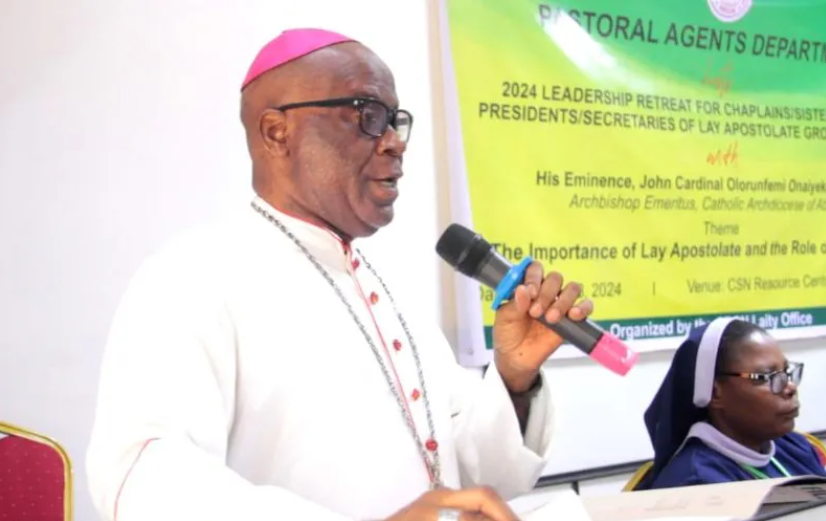“`html
Address Youth Challenges: Nigerian Catholic Bishop to Government
In a resonant call to the Nigerian government, a prominent Catholic Bishop in Nigeria has urged authorities to pay close attention to the multifaceted and profound challenges faced by the youth. These remarks come in the wake of increasing concerns regarding the myriad social, economic, and political issues that young Nigerian citizens encounter daily. This blog post delves into the Bishop’s recommendations, the current state of youth challenges in Nigeria, and why it is imperative for the government to act swiftly and deliberately.
The Voice of Leadership: Bishop’s Call to Action
During a recent event, the Catholic Bishop emphatically addressed the pressing need for comprehensive governmental intervention aimed at alleviating the myriad difficulties faced by Nigerian youths. He highlighted several key areas that require immediate attention:
- Education and Skill Development: Increasing access to quality education and vocational training to empower youths with the skills they need for the modern job market.
- Employment Opportunities: Creating a conducive environment for job creation, including supporting small-sized and medium-sized enterprises (SMEs).
- Mental Health: Addressing the psychological impact of unemployment, insecurity, and societal pressures on young individuals.
- Social Infrastructure: Enhancing educational and recreational facilities to promote a sense of community and well-being.
- Involvement in Governance: Encouraging active political participation and representation of youth in decision-making processes.
Understanding the Multifaceted Challenges
Educational Barriers
Education remains one of the most critical areas requiring urgent reform. Many Nigerian youths lack access to quality education due to inadequate funding, poorly maintained infrastructures, and geopolitical disruptions. Consequently, there is a high dropout rate, leaving many without the skills needed to compete in a globalized workforce.
Unemployment Crisis
Unemployment and underemployment plague Nigerian youth, contributing to widespread despair and socio-economic stagnation. Despite Nigeria’s rich resources, job creation remains sluggish. Youths often find themselves caught in a cycle of temporary, low-paying jobs that do not leverage their qualifications or aspirations.
Psychological and Social Issues
Prolonged unemployment and lack of opportunities have a detrimental impact on the mental health of young Nigerians. Issues such as anxiety, depression, and substance abuse are rampant. Additionally, social infrastructures like community centers and sports facilities are either lacking or inefficient, leaving little room for communal engagement and personal development.
The Role of Government in Tackling Youth Challenges
Educational Reforms
The government needs to prioritize funding for educational reforms. This includes upgrading school infrastructures, ensuring teacher quality, and integrating modern technologies into learning environments. Providing scholarships and financial aid can also help those from disadvantaged backgrounds to complete their education. Vocational programs aimed at teaching practical, employable skills should be an integral part of the educational system.
Boosting Employment and Entrepreneurship
The government should invest in policies and programs designed to spur job creation. Supporting SMEs through grants, subsidies, and tax incentives can create a ripple effect in the job market. Structuring internships and apprenticeship programs also offer practical work experiences that significantly enhance employability.
Moreover, promoting entrepreneurship among youth can harness their creativity and innovation. Initiatives like startup incubators, innovation hubs, and business development services can provide young entrepreneurs with the resources they need to succeed.
Focus on Mental Health
The government must acknowledge and address the mental health crisis affecting Nigerian youth. Establishing counseling centers, helplines, and support groups is a step in the right direction. Public awareness campaigns can also help destigmatize mental health issues, encouraging more youths to seek help.
Enhancing Social Infrastructure
Investing in social infrastructure like community centers, sports complexes, and recreational facilities can significantly improve the quality of life for young Nigerians. These spaces can serve as hubs for communal activities, personal development, and cultural engagement.
Additionally, incorporating youth in governance can foster a sense of belonging and responsibility. Forming youth councils and advisory boards with direct access to policymakers ensures that the concerns and ideas of the younger generation are heard and addressed.
Why It Matters: The Broader Implications
The youth demographic is a powerful force that can drive societal transformation if adequately harnessed. Addressing their challenges is not merely a matter of moral imperative but an essential strategy for national development. As the Bishop eloquently put it, “a society that neglects its youth neglects its future.” By focusing on these critical areas, the Nigerian government can create a more hopeful, stable, and prosperous nation for all its citizens.
Conclusion: A Collective Responsibility
Solving the profound and multifaceted challenges faced by Nigerian youth requires a concerted effort from all sectors of society. While the government has a pivotal role, religious organizations, private enterprises, and civil society must also contribute to this collective endeavor. The Bishop’s clarion call serves as a timely reminder that the future of Nigeria lies in the hands of its youth, and it is incumbent upon us all to invest in their potential.
With a balanced approach that combines immediate intervention with long-term strategies, we can create an environment where young Nigerians can thrive, lead, and transform their communities and the nation at large.
The time for action is now.
“`




